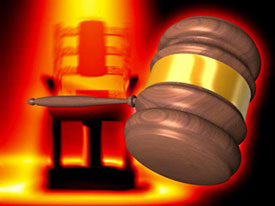Court ruling encourages death row opponents (FCN, 03-22-2005)

(FinalCall.com) – Activists in Puerto Rico are angry about President George Bush’s attempts to bring the death penalty back after 78 years—so angry that they called for a rally in front of the federal court in Jatorey in the capital city of San Juan.
“We plan to have pickets in front of the courthouse every day this week,” activist/attorney Jorje Farinacci told The Final Call during a phone interview from Puerto Rico.
Mr. Farinacci, a member of the Socialist Front of Puerto Rico, said the opposition to the return of the death penalty had reached 80 percent, crossing political and religious lines.
“The bar association, students, human rights commission, international activists and even the governor are against the latest attempt by the colonial powers in Washington to marginalize the people of Puerto Rico,” he stressed.
The Associated Press reported on Mar. 29 that Puerto Rico’s governor announced that he would ask the U.S. Justice Department not to apply the death penalty to residents of the island. Governor Anibal Acevedo Vila said he would “outline” Puerto Rican opposition to capital punishment in a letter to officials in the U.S. On Mar. 28, Puerto Rico’s House of Representatives approved a bill opposing the application of the death penalty to its residents. Gov. Vila told AP he asked that the island’s Senate do the same.
Activists, such as Mr. Farinacci, say the Bush administration is imposing the death penalty on the island in a “colonialist” fashion. Puerto Rico became a U.S. colony in 1989 as a result of the Spanish-American War.
“The death penalty, which had existed under Spanish rule, was retained by the new authorities. There were 23 executions between 1898 and 1929. All those executed were poor, at least 14 were Black,” writes Puerto Rican Socialist Rafael Bernabe in an article published in the International Viewpoint magazine.
Observers say that many Puerto Ricans believe that the death penalty infringes on Puerto Rico’s right to self-government. The island’s four million people, although declared U.S. citizens, do not have any vote in Congress.
According to AP, Puerto Rico banned capital punishment in 1927, and is now among 12 U.S. states and the District of Columbia that does not allow the death penalty. However, in 2001, the 1st U.S. Circuit Court of Appeals in Boston overturned the 2000 ruling of the Supreme Court of Puerto Rico that capital punishment violated the Caribbean island’s constitution.
On Mar. 31, El Diario reported that the Association of American Jurists, a non-governmental organization, protested the use of the death penalty in Puerto Rico to the United Nations.
At the heart of the uproar is the case of two men convicted of premeditated murder of a truck security guard three years ago. A U.S. federal judge told the six men and six women on the jury to reconvene on Apr. 11 for sentencing the pair. Their lawyers have argued that the pair did not plan to shoot the guard, but reacted badly to what they called “31 seconds of chaos.”
Analysts say that public opinion may change in the U.S. territory, as crime continues to increase. According to AP, there were 793 homicides in 2004, which they said were drug-related, surpassing the 2003 total of 780.
“We do not think that the death penalty is a deterrent to crime,” argues Mr. Farinacci, pointing out that there was a lot of social injustice in Puerto Rico, including police persecution. “The unemployment rate here is 20 percent,” he further noted.
“Who controls the economics of Puerto Rico?” asked Carlos Rovira, a New York-based member of the Socialist Front of Puerto Rico. He said that it is true that drugs have facilitated the rise in crime on the Caribbean island. “But, who controls the drug trade? Surely not the little people on the streets of Puerto Rico,” Mr. Rovira argues. “The death penalty will exacerbate the colonial relationship Puerto Ricans have with the U.S.”












